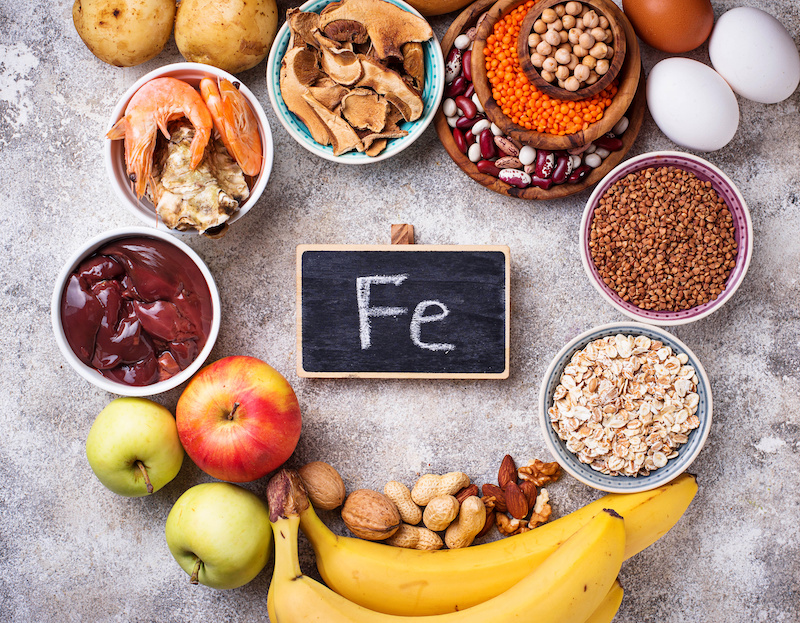- Empty cart.
- Continue Shopping
How to Maintain Healthy Iron Levels

Iron is a vital mineral that plays a crucial role in the body’s overall health. It’s essential for the formation of red blood cells, transportation of oxygen, and the proper functioning of various bodily processes. Maintaining healthy iron levels is essential to prevent iron deficiency anemia, which can lead to fatigue, weakness, and a range of health issues.
Understanding the Importance of Iron
Iron is a fundamental component of hemoglobin, a protein in red blood cells responsible for carrying oxygen from the lungs to various tissues and organs in the body. It’s also involved in myoglobin, a protein that helps muscles store and use oxygen. Here are some key functions of iron in the body:
- Oxygen Transport: Iron is essential for the proper oxygenation of tissues and organs, ensuring they function optimally.
- Energy Production: Iron is a component of enzymes involved in energy metabolism, helping the body generate energy from nutrients.
- Immune Function: Iron plays a role in immune system function, supporting the body’s defense against infections.
- Brain Function: Iron is necessary for cognitive functions, including memory and concentration.
Factors Affecting Iron Levels
Several factors can influence your iron levels, and understanding them is essential for maintaining a healthy balance:
- Diet: The type of foods you eat can impact iron levels. There are two types of dietary iron: heme iron (found in animal sources) and non-heme iron (found in plant and animal sources). Heme iron is more readily absorbed by the body.
- Iron Absorption: The body’s ability to absorb iron can be affected by other dietary components. For example, vitamin C enhances iron absorption, while certain compounds in tea and coffee can inhibit it.
- Age and Gender: Infants, adolescents, and pregnant women are at higher risk of iron deficiency due to increased iron requirements.
- Blood Loss: Conditions that result in blood loss, such as heavy menstruation, gastrointestinal bleeding, or injury, can deplete iron stores.
- Medical Conditions: Certain medical conditions, such as celiac disease or inflammatory bowel disease, can impair iron absorption.
- Medications: Some medications can interfere with iron absorption or lead to gastrointestinal bleeding.
Now that we understand the importance of iron and the factors affecting its levels, let’s explore practical ways to maintain healthy iron levels.
Tips for Maintaining Healthy Iron Levels
1. Consume Iron-Rich Foods
Include a variety of iron-rich foods in your diet to ensure an adequate intake of this essential mineral. Good sources of heme iron include red meat, poultry, fish, and organ meats like liver. Non-heme iron sources include beans, lentils, tofu, spinach, fortified cereals, and nuts.
2. Enhance Iron Absorption
Pair non-heme iron sources with foods high in vitamin C, such as citrus fruits, strawberries, and bell peppers, to improve iron absorption. Conversely, avoid consuming calcium-rich foods or supplements at the same time as iron-rich meals, as calcium can inhibit iron absorption.
3. Cook with Cast Iron
Cooking acidic foods like tomato sauce in cast iron cookware can increase the iron content of the food. However, be mindful that this method may also alter the taste of certain dishes.
4. Choose Fortified Foods
Select fortified foods like iron-fortified cereals, bread, and plant-based milk alternatives. These can be particularly beneficial for individuals with dietary restrictions or preferences that limit their iron intake.
5. Diversify Your Diet
Aim for a well-balanced diet that includes a variety of food groups. A diverse diet not only provides essential nutrients but also helps prevent food fatigue and encourages healthy eating habits.
6. Be Mindful of Coffee and Tea
Limit the consumption of coffee and tea, especially around meal times, as the compounds in these beverages can inhibit iron absorption. If you rely on caffeine, consider drinking it between meals.
7. Cook in a Cast Iron Skillet
Cooking in a cast iron skillet can slightly increase the iron content of your meals, particularly when preparing acidic foods like tomato-based dishes.
8. Monitor Your Iron Levels
If you suspect a deficiency or are at risk due to dietary restrictions or medical conditions, consult with a healthcare provider. They can perform blood tests to assess your iron levels and recommend appropriate interventions.
9. Iron Supplements
In some cases, healthcare providers may recommend iron supplements to address deficiencies. It’s crucial to take these supplements as directed, as excessive iron intake can have adverse effects.
10. Manage Blood Loss
For individuals with conditions leading to blood loss, such as heavy menstruation or gastrointestinal bleeding, it’s essential to manage these issues with medical guidance to prevent iron deficiency anemia.
11. Stay Hydrated
Adequate hydration is essential for overall health and can help maintain healthy iron levels. Dehydration can impair circulation and oxygen transport in the body.
12. Cook Foods Properly
Cook meat thoroughly to ensure its safety, but avoid overcooking, which can lead to a loss of iron content. When preparing vegetables, consider methods like steaming or microwaving to retain iron levels.
In Conclusion, Maintaining healthy iron levels is essential for overall well-being, as iron plays a critical role in oxygen transport, energy production, and various bodily functions. By incorporating iron-rich foods into your diet, enhancing iron absorption, and addressing risk factors like blood loss or dietary restrictions, you can ensure that your body has an adequate supply of this vital mineral. If you suspect an iron deficiency, consult with a healthcare provider for proper diagnosis and guidance on the most appropriate interventions. Remember that a balanced diet and mindful dietary choices are key to supporting your iron levels and overall health.








